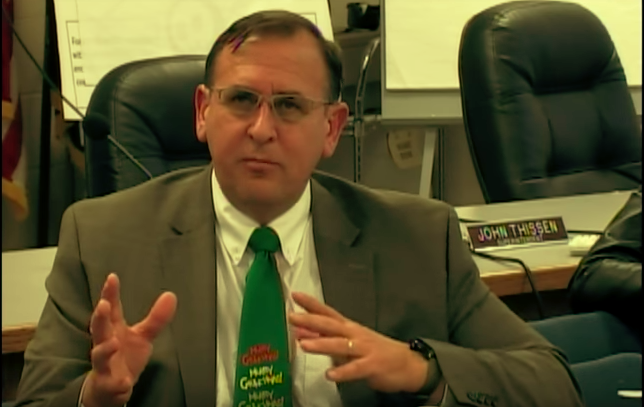The Hays USD 489 Board of Education tabled a measure Monday to create a program that would help Hays teachers earn master’s degrees.
Under the program, USD 489 would pay a third of teachers’ tuition, Fort Hays State University would pay a third and the teachers would pay a third. The district estimates the program would cost $4,000 to $7,000 per year, Thissen said.
Superintendent John Thissen said the program could help the district get more teachers qualified to teach concurrent credit courses as well as fill high-demand teaching positions such as special education.
The state’s new accreditation standards measure how successful high school graduates are at receiving post-secondary degrees or certificates. The Kansas Education Commissioner recently met with a group of the state’s superintendents, including Thissen, to discuss the importance of concurrent courses offered at the state’s public high schools.
If a student receives 10 to 15 credit hours of concurrent credit in high school, they are significantly more likely to be successful in their post-secondary education, Thissen said.
The commissioner discussed the possibility legislation may be introduced that would require the state to pay for concurrent credit classes for high school students.
However, the group expressed concern about having enough qualified teachers to offer the classes. They expressed interest in the proposed USD 489/FHSU program and suggested the program could be replicated in other areas of the state.
Thissen said the district has a good concurrent credit program, but several of the teachers in the program are nearing retirement age, and the district needs to have younger teachers to take their places.
“We are able to offer these courses so we are able to link into programs early on for a post-secondary plan,” he said. “We’ve had a very, very good number of students that are involved in that.”
Board member Josh Waddell asked how the program would directly benefit the district and what restrictions there might be on who applies for the program. He said he would support the plan if it would increase the diversity within the teaching pool and would mean the high school could offer more classes.
“Just to say that someone is going to go earn a master’s degree — you are going to be hard pressed to say that person is going to be a better teacher just because they have a master’s degree,” he said.
Thissen said district officials discussed putting restrictions on the program, but he wanted to go through the first year or two and see what the interest was before putting any restrictions on the plan. The USD 489 administration would have to approve all the teachers for the program, and all teachers in the program have to earn admittance into the FHSU grad school.
“I love the idea of the assistance and promoting the advanced education,” Waddell said. “I just don’t like the open endedness of it. I would like to see a guaranteed equity back to our district. That is our stumbling block here.”
Board member Greg Schwartz said he thought teachers already received enough compensation in their salary for earning advanced degrees. In addition, they earn money when they teach concurrent courses.
“What if we did all this, and they get their master’s and leave and go somewhere else?” Schwartz said.
Schwartz said a similar program at HaysMed helps LPNs get their RN certifications, but they have to continue to work at HaysMed for a period of years. If they don’t, they have to pay back the money HaysMed paid for their education.
Board member Mandy Fox said in the first year the district could limit the types of programs teachers could pursue.
“What is that person’s end goal?” Fox said. “Are they going to go back and teach those exact same classes as they did before?”
Board member Luke Oborny said he thought the board supported the program, but a few details needed to be worked out.
Fort Hays State University officials said they would like to open the program up for any teacher in the county. FHSU has already signed the agreement.

